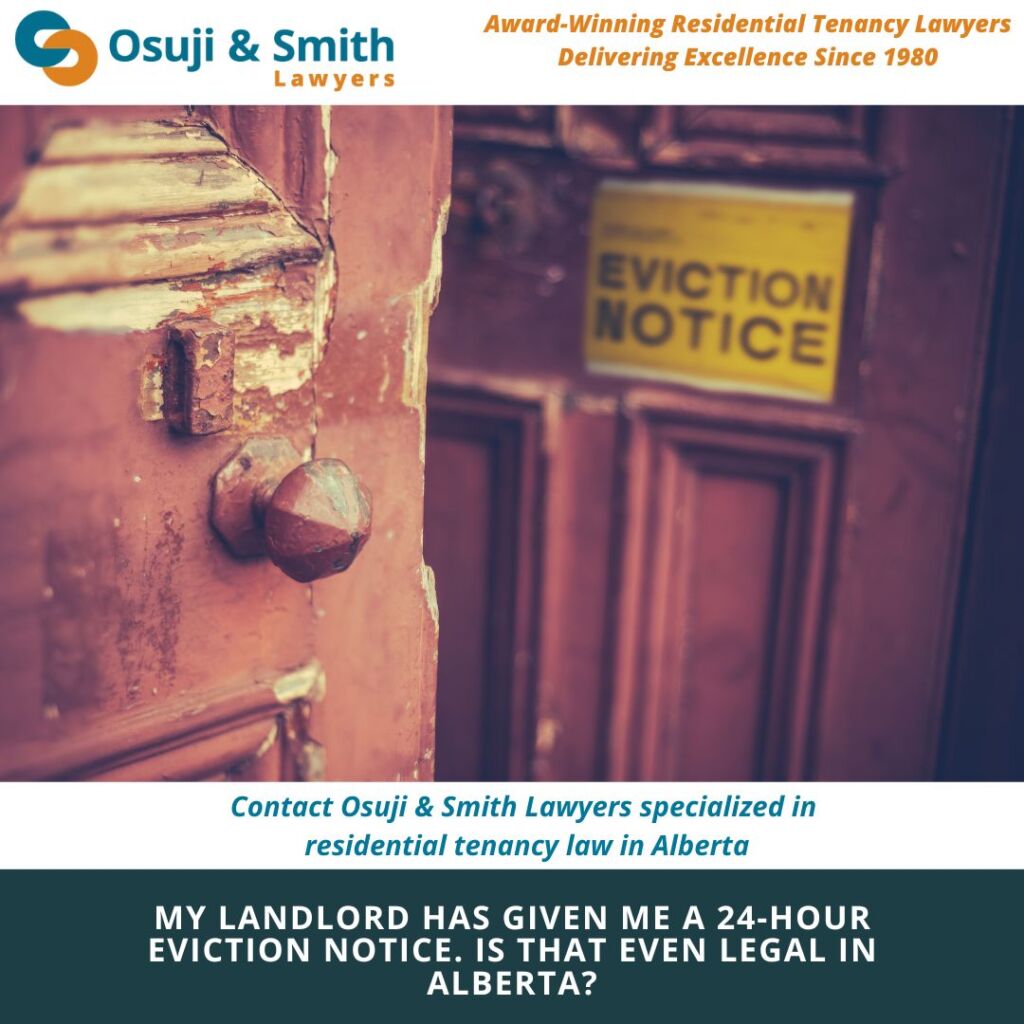My landlord has given me a 24-HOUR EVICTION NOTICE. Is that even legal in Alberta?
In Alberta, landlords can evict tenants for a variety of reasons, including failure to pay rent, engaging in illegal activities on the premises, or causing significant damage to the property. However, landlords must follow specific legal procedures before evicting tenants. These procedures are outlined in the Residential Tenancies Act, which is the primary legislation governing the relationship between landlords and tenants in Alberta.
Under the Residential Tenancies Act (the Act), landlords must provide tenants with written notice of eviction. The notice must be served in a manner prescribed by the Act, which typically involves either personal service or registered mail. The amount of notice required depends on the reason for the eviction. For example, if the eviction is due to non-payment of rent, the landlord must provide the tenant with a 14-day notice to remedy the situation. If the tenant does not pay the rent within the 14-day period, the landlord can then file an application with the Residential Tenancy Dispute Resolution Service (RTDRS) to seek an eviction order.
If the eviction is due to a breach of the lease agreement, such as causing minor damage to the property or engaging in illegal activities, the landlord must provide the tenant with a 14-day notice to vacate. If the tenant does not leave the property within the 14-day period, the landlord can then apply to the RTDRS for an eviction order.

It is important to note that, in most cases, landlords cannot simply provide tenants with a 24-hour eviction notice without following the proper legal procedures. The Residential Tenancies Act requires landlords to provide tenants with sufficient notice to allow them to remedy the situation or find alternative housing. A 24-hour eviction notice is not usually considered sufficient notice under the Act.
The only exception is when the tenant has caused significant damage to the property or has (or threatens to) physically assault either the landlord or any other tenant. In this case, either a 24-hour notice is acceptable, or the landlord can even run to court (without any notice to the tenant) and obtain an order to terminate the tenancy without any notice at all. Obviously, these are very exceptional cases.
If you have received a 24-hour eviction notice, you should immediately seek legal advice. The first step is to contact the RTDRS and ask for assistance. The RTDRS provides free dispute resolution services to landlords and tenants and can help you understand your rights and obligations under the Act. They can also provide you with information on how to file an application for dispute resolution if necessary. If you meet the low-income tests, you may also qualify for assistance from Calgary Legal Guidance (CLG).
In addition to seeking assistance from the RTDRS or CLG, you may want to consider contacting a lawyer who specializes in residential tenancy law. A lawyer can provide you with legal advice tailored to your specific situation and help you navigate the eviction process.
If you have received a 24-hour eviction notice in Alberta, it is important to understand your legal rights and seek professional legal advice as soon as possible. Landlords must follow specific legal procedures before evicting tenants, and a 24-hour eviction notice is usually not considered sufficient notice under the Residential Tenancies Act. Contacting the RTDRS and a lawyer who specializes in residential tenancy law can help you protect your rights and ensure that the eviction process is fair and legal.
Written by: Shikha Shukla

